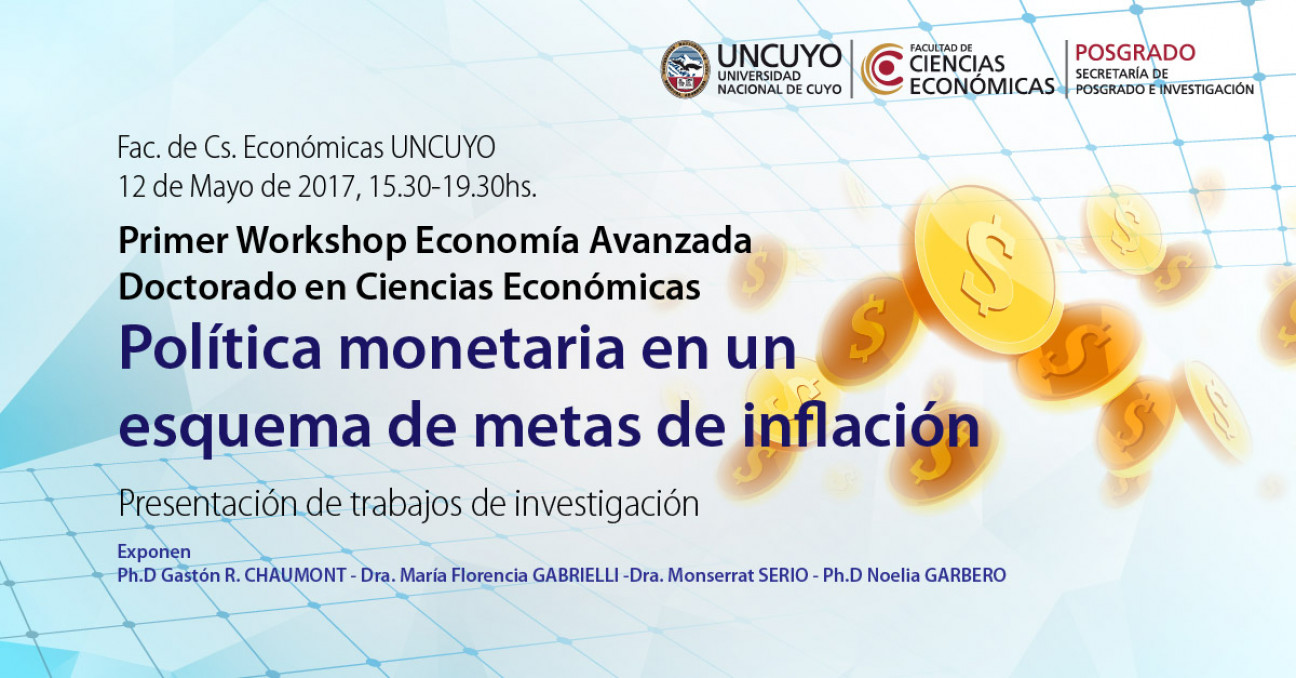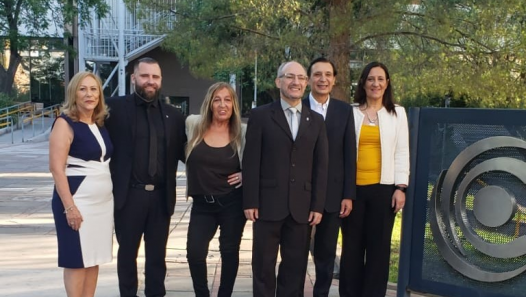Conferencia invitada: "Política Monetaria en un Esquema de Metas de Inflación". (18.30hs)
Expositor: Gastón R. CHAUMONT (Ph. D. candidate Pennsylvania State University)
Presentación de trabajos de investigación: (15.30-18.30hs)
Expositores:
15.30hs: Gastón R. CHAUMONT (Ph. D. Candidate Pennsylvania State University)
Título en español: "Acumulación de riqueza, búsqueda de trabajo y desigualdad."
Título del paper: "Wealth accumulation, on the job search, and inequality."
Abstract
To study equilibrium interactions between wealth accumulation and labor market search, this paper constructs a model where individuals can accumulate non-contingent assets under a borrowing limit, all workers can search for jobs, and search is directed. On-the-job search generates a wage ladder, which affects inequalities in earnings, wealth and consumption. Employed workers have incentive to save as a precaution for exogenous separation into unemployment. In the reverse direction, wealth and earnings affect search decisions by changing the optimal trade-off between the wage and the matching probability. The calibrated model reveals that wealth significantly reduces a worker’s transition rates from unemployment to employment and from one job to another. Moreover, search frictions increase wealth inequality significantly by increasing the mass of wealthy individuals and lengthening the right tail of the wealth distribution. However, the effect of wealth on job search widens frictional wage dispersion by only a small amount. In addition, on-the-job search is important for frictional wage dispersion.
16.05hs: Dra. María Florencia GABRIELLI (FCE-UNCuyo, CONICET) y Dra. Monserrat SERIO (FCE- UNCuyo, CONICET).
Expositor: Monserrat Serio
Título en español: “Un análisis de emparejamiento selectivo en la formación de matrimonios en Argentina”
Título del paper: “Testing assortative mating: evidence from Argentina”
Abstract
In this paper, we study the marriage market in Argentina. In particular, we test the positive -assortative- mating (PAM) hypothesis that posits that marriages can be positively sorted along the couple's education, using survey data from Greater Buenos Aires between 1980 and 2014. First, we use a regression approach to assess assortative mating controlling by many family level characteristics. We find that the effect of husbands' education on wife's education is positive and significant. Then, we empirically verify if the observed matching distribution is super-modular, i.e., the local log odds ratios of education are all positive. We conclude that the data (weakly) supports Becker's positive assortative mating hypothesis in Argentina. The model that best describes marriage formation is more consistent with preference for own type rather than with PAM.
16.40hs: Noelia GARBERO (Ph.D. candidata Universidad Nacional de La Plata)
Título en español: “Midiendo los efectos de la Globalización sobre la Desigualdad y Pobreza a nivel subnacional. Evidencia para Argentina.”
Título del paper: “Measuring the effects of Globalization on Inequality and Poverty at subnational level. Evidence for Argentina.”
Abstract
The aim of this paper is to study the effects of globalization on inequality and poverty in Argentina in a context of global debate regarding the benefits and costs of being integrated. Much of the existing literature has examined this relationship at the country level. This paper makes two contributions regarding the previous literature. First, it extends the analysis to the Argentine provinces or subnational units. Second, it uses a globalization index, KOFA, adapted from the KOF index proposed by Dreher (2006) and estimated, for the first time, at the provincial level. This index contemplates the three dimensions of globalization (economic, social and political), being more general than the traditional measures of globalization. In turn, it uses microdata from the Permanent Household Survey of Argentina for the 24 jurisdictions in the period 1995-2013. This allows the use of indicators of inequality other than the GINI, as the wage premium between skilled and unskilled workers and the ratio between the income of each decile and the average income. Furthermore, it ensures the comparability of the indicators between the provinces and over time. A dynamic panel data model is estimated using GMM in Systems to control the endogeneity problem. The results indicate that globalization has a negative effect on all indicators of inequality and poverty. The effects on inequality appear to be a consequence of the fall in the wage premium.
17.10hs: Dr. Luis Alcalá (Universidad Nacional de San Luis, IMASL-CONICET, Doctorado FCE-UNCuyo)
Título en español: “Crecimiento estratégico con preferencias recursivas: Impaciencia marginal decreciente”
Título del paper: “Strategic Growth with Recursive Preferences: Decreasing Marginal
Impatience”
Abstract
This paper studies a two-agent strategic model of capital accumulation with heterogeneity in preferences and income shares. Preferences are represented by recursive utility functions that satisfy decreasing marginal impatience. The stationary equilibria of this dynamic game are analyzed under two alternative information structures: one in which agents precommit to future actions, and another one where they use Markovian strategies. In both cases, we develop sufficient conditions to show the existence of these equilibria and characterize their stability properties. Under certain regularity conditions, a precommitment equilibrium shows monotone convergence of aggregate variables, but Markovian equilibria may exhibit nonmonotonic paths, even in the long-run.
18.00hs: Café



